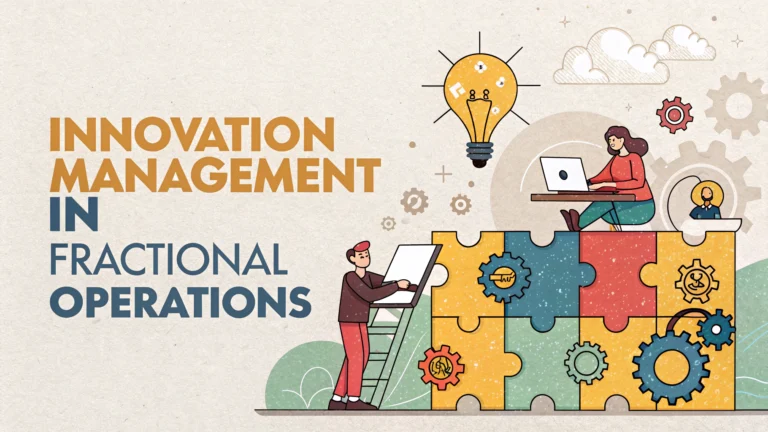Managing innovation as a fractional COO requires balancing strategic thinking with practical execution while working across multiple organizations.
Successful innovation management in a fractional capacity depends on establishing clear processes that can be implemented consistently across different company cultures and structures.
This guide outlines proven approaches for fractional COOs to drive innovation effectively while maintaining operational excellence across their portfolio of clients.
Key Innovation Management Responsibilities
- Setting innovation strategy aligned with each company’s goals
- Creating structured innovation processes and frameworks
- Establishing metrics to measure innovation success
- Managing resource allocation across innovation projects
- Building innovation-friendly company cultures
Establishing Innovation Frameworks
A standardized innovation framework helps fractional COOs implement consistent processes across multiple organizations:
- Idea Generation: Structured brainstorming sessions and idea collection systems
- Evaluation: Clear criteria for assessing innovation potential
- Prioritization: Resource allocation based on strategic fit
- Implementation: Project management and execution plans
- Measurement: KPIs to track innovation outcomes
Tools for Innovation Management
| Tool Type | Recommended Solutions | Best For |
|---|---|---|
| Idea Management | IdeaScale, Brightidea | Collecting and organizing innovation ideas |
| Project Management | Asana, Monday.com | Tracking innovation initiatives |
| Collaboration | Miro, MURAL | Virtual innovation workshops |
Measuring Innovation Success
Track these key metrics across your client organizations:
- Number of new ideas generated
- Implementation rate of approved innovations
- Time from idea to implementation
- ROI on innovation projects
- Employee engagement in innovation activities
Building Innovation Culture
Create these essential elements in each organization:
- Regular innovation workshops and training
- Clear communication channels for sharing ideas
- Recognition programs for innovative contributions
- Protected time for innovation activities
- Safe-to-fail environments for experimentation
Common Challenges and Solutions
| Challenge | Solution |
|---|---|
| Limited time across organizations | Implement automated innovation management systems |
| Different company cultures | Adapt frameworks to fit each organization |
| Resource constraints | Focus on quick wins and gradual scaling |
Next Steps for Innovation Success
Contact innovation management software providers for demos and trials to find the right tools for your client portfolio:
- IdeaScale: www.ideascale.com
- Brightidea: www.brightidea.com
- Monday.com: www.monday.com
Implementation Strategies
Successful innovation management requires a phased approach when working across multiple organizations:
Phase 1: Assessment
- Evaluate current innovation capabilities
- Identify organizational strengths and gaps
- Map existing processes and tools
- Define priority areas for improvement
Phase 2: Foundation Building
- Implement core innovation frameworks
- Set up essential tools and systems
- Train key stakeholders
- Establish baseline metrics
Scaling Innovation Programs
Scale innovation initiatives across organizations through:
- Pilot Programs: Test approaches in smaller teams
- Success Documentation: Create case studies of wins
- Cross-Organization Learning: Share best practices
- Systematic Expansion: Roll out to larger groups
Risk Management
| Risk Type | Mitigation Strategy |
|---|---|
| Innovation fatigue | Rotate focus areas and teams |
| Resource overallocation | Implement stage-gate processes |
| Loss of momentum | Regular progress reviews and celebrations |
Maximizing Innovation Impact
Create lasting value through innovation management by:
- Developing sustainable innovation ecosystems
- Building internal innovation capabilities
- Creating scalable frameworks
- Establishing innovation as core business practice
- Measuring and communicating impact consistently
FAQs
- What is a Fractional COO’s role in innovation management?
A Fractional COO helps organizations develop and implement innovation strategies on a part-time basis, focusing on operational efficiency, process improvement, and strategic growth initiatives. - How does a Fractional COO balance innovation with day-to-day operations?
They prioritize initiatives by creating structured frameworks, establishing innovation metrics, and integrating new processes while maintaining operational stability through systematic implementation approaches. - What innovation management tools do Fractional COOs typically use?
Common tools include innovation management software, project management platforms, idea management systems, and analytics tools to track implementation progress and measure innovation outcomes. - How do Fractional COOs foster an innovation culture in part-time roles?
They establish innovation committees, implement reward systems, create communication channels for idea sharing, and develop processes that encourage experimentation and calculated risk-taking. - What metrics do Fractional COOs use to measure innovation success?
Key metrics include ROI on innovation projects, number of implemented ideas, time-to-market for new initiatives, revenue generated from new innovations, and employee engagement in innovation activities. - How do Fractional COOs manage innovation budgets effectively?
They allocate resources based on strategic priorities, implement stage-gate processes for funding, and create flexible budget models that allow for quick pivots and experimentation. - What role does a Fractional COO play in innovation partnerships and collaborations?
They identify and evaluate potential partners, structure collaboration agreements, manage joint innovation projects, and ensure alignment between partnership activities and organizational goals. - How do Fractional COOs handle innovation risk management?
They develop risk assessment frameworks, implement pilot programs, create contingency plans, and establish metrics to monitor and mitigate potential risks in innovation initiatives. - What strategies do Fractional COOs use to accelerate innovation adoption?
They focus on change management, stakeholder engagement, training programs, and creating clear implementation roadmaps to ensure successful adoption of innovations. - How do Fractional COOs align innovation initiatives with business strategy?
They conduct regular strategic reviews, map innovation projects to business objectives, and ensure innovation efforts support long-term organizational goals and market positioning.







